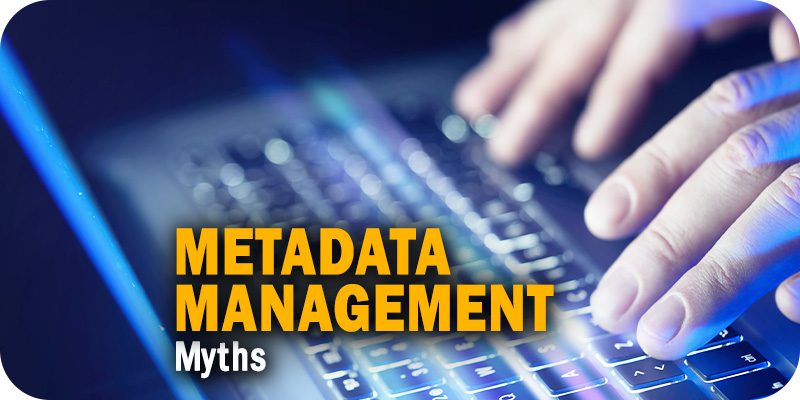Solutions Review editors created this short resource highlighting the most common metadata management myths to stand clear of.
In the realm of data management, metadata plays a crucial role in providing context, understanding, and accessibility to data assets. However, misconceptions and myths surrounding metadata management can hinder organizations from fully leveraging its potential. In this article, we aim to debunk some of the greatest metadata management myths, providing insights and best practices to help organizations harness the true power of effective data governance and metadata management.
Metadata Management Myths
Myth 1: Metadata Management is Optional
One common misconception is that metadata management is an optional or secondary aspect of data management. In reality, metadata is the backbone of effective data governance and management. Metadata provides critical information about the structure, meaning, and lineage of data, enabling organizations to understand, organize, and utilize their data assets effectively. By implementing metadata management practices, organizations gain insights into data quality, lineage, and usage, leading to improved decision-making, data discovery, and regulatory compliance.
Myth 2: Metadata Management is Only for IT Professionals
Another prevalent myth is that metadata management is solely the responsibility of IT professionals. While IT plays a vital role in implementing metadata management systems and technologies, effective metadata management requires collaboration between IT and business stakeholders. Business users, data owners, and data stewards possess valuable domain knowledge that contributes to meaningful metadata creation and maintenance. By involving all relevant stakeholders, organizations can ensure that metadata reflects the business context, making it more valuable and actionable for users across the organization.
Myth 3: Metadata Management is a One-Time Project
Some organizations mistakenly view metadata management as a one-time project with a definitive endpoint. However, metadata management is an ongoing process that requires continuous attention and maintenance. As data assets evolve and new data sources are introduced, metadata needs to be updated and expanded. Organizations must establish metadata governance practices, define metadata standards, and regularly review and update metadata definitions to keep pace with the changing data landscape. Treating metadata management as an ongoing effort ensures the accuracy, relevance, and usefulness of metadata over time.
Myth 4: Metadata Management is Costly and Time-Consuming
There is a misconception that metadata management is a costly and time-consuming endeavor. While metadata management does require investments in tools, technologies, and resources, the long-term benefits far outweigh the initial costs. Effective metadata management improves data understanding, facilitates data integration, enhances data search capabilities, and reduces the time spent searching for relevant information. By implementing automation, standardization, and data governance practices, organizations can optimize the efficiency of metadata management and maximize its value without breaking the bank.
Myth 5: Metadata Management is Irrelevant in the Age of Artificial Intelligence
With the rise of artificial intelligence (AI) and machine learning (ML), there is a myth that metadata management is no longer relevant. However, metadata remains critical in AI and ML initiatives. Metadata provides essential information about the context, quality, and characteristics of data, enabling AI algorithms to make informed decisions. Metadata helps in data preprocessing, feature engineering, and model training, ensuring the accuracy and reliability of AI and ML outputs. Effective metadata management ensures the success and integrity of AI and ML initiatives, making it more crucial than ever in the age of advanced analytics.
Final Thoughts
Metadata management is a fundamental aspect of effective data governance and management. By debunking the myths surrounding metadata management, organizations can unlock its true potential. Metadata management is not optional but a critical component of data management strategies. It requires collaboration between IT and business stakeholders, ongoing attention, and the right combination of tools, standards, and practices. By embracing metadata management, organizations can enhance data understanding, improve decision-making, and maximize the value of their data assets. Effective metadata management is a cornerstone of successful data governance, empowering organizations to navigate the data landscape with confidence, ensure data quality and compliance, and derive actionable insights from their data assets.
Debunking the myths surrounding metadata management is crucial for organizations to fully leverage its power in effective data governance and management. Metadata serves as the bridge between data and understanding, providing essential context and meaning to data assets. By recognizing metadata management as a vital component of data management strategies, involving both IT and business stakeholders, treating it as an ongoing effort, and leveraging automation and standards, organizations can unlock the true value of metadata. Effective metadata management enhances data discovery, decision-making, and regulatory compliance, enabling organizations to harness the full potential of their data assets and stay ahead in the data-driven world.
- The 5 Greatest Data Lake Myths and How to Avoid Them - June 30, 2023
- The 5 Greatest Master Data Management Myths and How to Avoid Them - June 30, 2023
- The 5 Greatest Metadata Management Myths and How to Avoid Them - June 30, 2023





